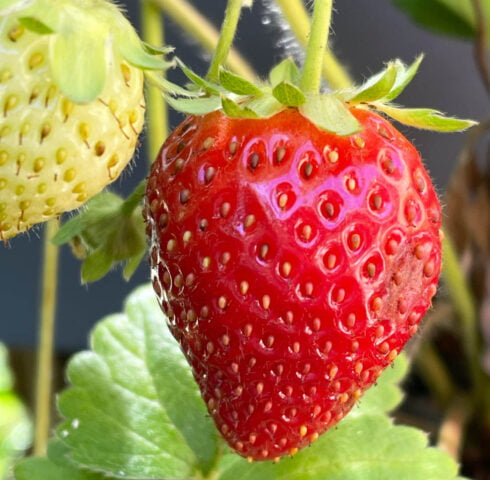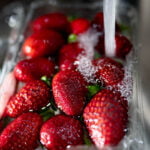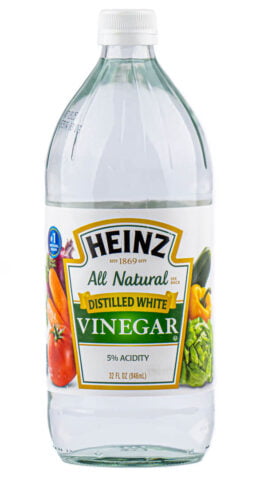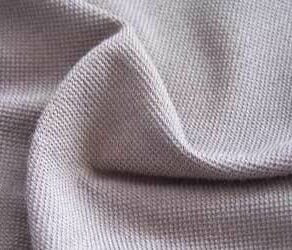Do you Have to Wash Strawberries, Even if they’re Organic?
Absolutely! Conventionally-grown strawberries have the highest pesticide contamination rate of all produce by several orders of magnitude, and though organically-grown strawberries aren’t treated with laboratory-created, toxic chemicals, they still come into contact with natural counterparts and should be cleansed before eating.

Regarding conventionally-grown strawberries, according to the Environmental Working Group (EWG);
“Non-organic strawberries tested by scientists at the Department of Agriculture in 2015 and 2016 contained an average of 7.8 different pesticides per sample, compared to 2.2 pesticides per sample for all other produce, according to EWG’s analysis.”
Environmental Working Group (EWG)
EWG goes on to explain the various methods which are used in both non-organic and organic strawberry-farming. If you’re interested, it’s a good read. As a result of the copious amount of pesticides needed to grow strawberries off-season, strawberries have earned the number #1 spot in EWG’s Dirty Dozen (The top 12 most highly-contaminated fruits and vegetables).
So What’s The Best Way to Remove all of Those Pesticides from Fresh Strawberries?

According to the USDA, using any type of detergent may cause the produce to absorb trace amounts of it. This means you shouldn’t wash your produce with anything you wouldn’t feel safe eating! They go on to state:
a cold water washing removes anywhere from 75 to 80 percent of pesticide residues from produce.
United States Department of Agriculture
75 to 80% is good, but surely we can achieve better results, right? Who wants to ingest ANY pesticide? Well, according to the Centre for Science and Environment:

Washing with 2% salt water will remove most of the contact pesticide residues that normally appear on the surface of the vegetables and fruits.
Centre for Science and Environment
Though no exact numbers were used, salt water seems like a promising non-toxic lead, so let’s add that to the plan.
The next problem is that after removing pesticide residues your strawberries may still be contaminated with dirt, germs and viruses that were accumulated during harvesting, packaging, shipping, merchandising, purchasing and transporting home. According to the National Sanitation Foundation, Vinegar can be used to address this:

Vinegar is about five percent acetic acid, which helps it break down the structure of some dirt, oils, films, stains and bacteria. [ … ] “Set time,” or the time a disinfectant must rest on a surface in order to work effectively, is also important. The set time for vinegar can be up to 30 minutes.
National Sanitation Foundation
OK. Water, salt and vinegar. No problem.
Why you Should Never Wash Strawberries with Soap
According to the United States Department of Agriculture:
Consumers should not wash fruits and vegetables with detergent, soap or commercial produce washes. These products are not approved or labeled by the U.S. Food and Drug Administration (FDA) for use on foods. You could ingest residues from soap or detergent absorbed on the produce and get sick.
USDA
The National Pesticide Information Center echoes a similar sentiment:
Dish soap or bleach can get trapped or absorbed by the pores and become difficult to rinse off the fruit once they have been applied.
National Pesticide Information Center

Strawberries have soft, moist flesh that readily absorbs moisture – so applying a soapy residue could conceivably result in you eating whatever it is you wash them in. No studies have been conducted (that we are aware of) that can either confirm or deny this claim, and you’re free to wash them in whatever you would like. If you do choose to use a detergent, we would urge you to wash them quickly to reduce the amount of time the soap is in contact with your strawberries.
When Should You Wash your Strawberries?
Wash strawberries as close to use as possible. No matter what method you use to wash strawberries, they will spoil faster once they’ve been washed.
How to Store your Unwashed Strawberries

Food Folks and Fun has tested a few of the more popular methods of storing strawberries in the fridge. The method that kept strawberries freshest longest was to seal them up in glass canning jars. -but any glass, airtight storage container will work fine.
If your strawberries are damp or wet, either pat them dry or add some paper towels to the bottom of the container. Just fill them up, seal them, and put them into the fridge just like that – don’t wash them until you’re ready to use them! If your strawberries are fresh, they should last 2-3 weeks using this method.
Washing Strawberries with a Salt and Vinegar Bath
We learned above that salt water can deliver a double-whammy in removing pesticide residue, and that vinegar is effective at breaking down dirt and killing bacteria. Below we will explain how to properly wash your strawberries using both salt and vinegar – but feel free to omit one or the other if you would like.
Strawberry Bath Ingredients:
- Fresh Strawberries
- A bowl large enough to hold the strawberries
- Salt (iodized, sea salt, any edible salt will do)
- Distilled White Vinegar (Apple Cider Vinegar works as well. Don’t use cleaning vinegar)
- Water (tap is fine)
Prepare the Salt and Vinegar Bath:
In your bowl, for every 3 cups of (room temperature) water, add 1 cup of vinegar and 3 tbsp of salt. Swish it around and let sit until the salt dissolves.
Wash your Berries
When all of the salt has been dissolved, dump your strawberries in the bowl and gently, but firmly agitate them in the water. This will help loosen any dirt or grime that is stuck on their surface or lodged under the leaves. Scoop up a handful and place them back in the bath. Work them for 15-30 seconds, and then let them sit in the batch for 5 minutes.
The previously-cited papers claim that it can take up to 30 minutes for vinegar to exert its full disinfecting potential, but we don’t recommend letting your strawberries soak for that long as they can get waterlogged and absorb some of the vinegar.
After 5 minutes, gently transfer the strawberries into a colander and vigorously rinse them under running tap water. This step will remove any remaining soil, salt and vinegar.
Once you’re satisfied with the rinse, gently dump them onto a clean towel and pat them dry.
Other Considerations
Should you wash organic strawberries?
Absolutely! Though organic strawberries generally have a much lower pesticide contamination rate than conventionally-grown strawberries, they still carry some natural pesticide contamination, along with dirt and germs contributed by each person who has handled them between the farm and your kitchen.
Do you wash strawberries with stems on or off?
Always keep the stems and leaves on the strawberries until after you’ve washed them. Removing the stems damages the flesh and allows them to absorb whatever you wash them in.
Can you store strawberries in a Ziploc bag?
Yes, but glass storage containers will make them last longer. If you use a Ziploc, blow into the bag before sealing it to increase the amount of airspace.
Does washing strawberries in vinegar change the taste?
Only if you allow them to sit in the vinegar for too long. If you soak them in vinegar for 2-5 minutes and rinse them well afterward, their taste will not be effected.









Leave a reply